-
About the Ministry
About the Ministry
- Press
- Countries & Regions
- Policy Information
- Life In Korea
Domestic Procedure for Treaty Making
-
-
Bilateral Treaty-Making Process
-
Why the treaty-making process is important
A treaty is a promise made among subjects of international law and stipulates certain legal rights and obligations. The breach of a treaty is a matter of legal responsibility. The treaty-making process is important in this respect and can be regarded as the process in which a state makes a legal contract with other states or other subjects of international law.
A treaty duly concluded has the same effect as the domestic laws of the Republic of Korea, which the people of Korea have the obligation to observe.
Therefore, the Ministry of Foreign Affairs, which controls and coordinates foreign relations, endeavors to reflect and respect national interests when concluding treaties.
-
How a bilateral treaty is concluded
It is not easy for two countries that have different cultures and legal systems to accommodate their conflicting interests in a legal document. A state which has independent decision-making authority may limit its authority and rights by concluding and implementing a treaty. Therefore, a state has to negotiate carefully with other states and follow the domestic procedures in accordance with its national legislation before it expresses consent to be bound by a treaty.
-
Korea concludes bilateral treaties in the following manner:
- Decision on the Necessity of a Treaty
First, a decision is made on the necessity of concluding a treaty in a specific area by the ministries in charge of the area at issue. - Negotiation and Drafting of an Agreed Text
Negotiations, either through meetings, talks, or through diplomatic channels, are held with the other state to reach an agreement on the text draft of the treaty. The appointment of those who, for particular purposes, have the power to negotiate with foreign governments, is carried out in accordance with the Act on the Appointment and Powers of Government Delegates and Special Envoys. Negotiations by government delegates are directed and supervised by the Minister of Foreign Affairs. The Bureau of the Ministry of Foreign Affairs, that is in charge of the negotiations for a particular treaty, prepares a draft text in consultation with the International Legal Affairs Bureau of the Ministry of Foreign Affairs and other ministries concerned. The chief delegate initiates the agreed text after negotiations take place with the other state.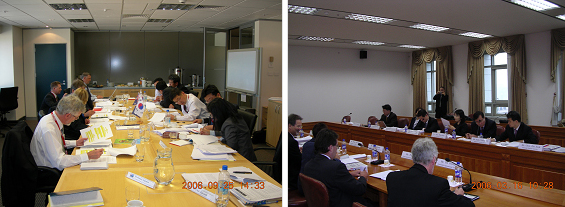 Negotiations for the Korea-Australia Social Security Agreement
Negotiations for the Korea-Australia Social Security Agreement
- Beginning of the Domestic Procedure
The bureau that is in charge of the negotiation of a treaty sends the agreed treaty text and the corresponding Korean text to the International Legal Affairs Bureau and requests the Director-General to initiate the domestic procedures for concluding the treaty. - Review by the Ministry of Government Legislation
All proposed treaties are reviewed by the Ministry of Government Legislation before being sent to the State Council for its deliberation. The International Legal Affairs Bureau reviews the text and the corresponding Korean text and requests the Ministry of Government Legislation to review the proposed treaty texts. The Ministry notifies the International Legal Affairs Bureau of the review results, including the decision as to whether the treaty should be presented to the National Assembly. - Deliberation by the State Council
The International Legal Affairs Bureau refers treaties reviewed by the Ministry of Government Legislation to the State Council, in accordance with Article 89, paragraph 3 of the Constitution which stipulates that proposed treaties shall be referred to the State Council for deliberation. Before deliberation by the State Council, proposed treaties are discussed by the Council of Vice Ministers. In general, meetings of the Council of Vice Ministers are held every Thursday and meetings of the State Council are held every Tuesday. - Approval by the President
After the deliberation of the State Council, the agreed treaty text is given the President's approval. The International Legal Affairs Bureau submits the text for the Foreign Minister's and Prime Minister's countersignatures and the President's approval. - Signature
According to the Act on the Appointment and Powers of Government Delegates and Special Envoys, the Minister of Foreign Affairs may sign a treaty without requiring full powers issued by the President. Any other person may be appointed as a representative and sign a treaty if he or she possesses a valid instrument of full powers, which is issued by the Minister of Foreign Affairs. However, in the case of signing certain types of treaties, the President, on the recommendation of the Minister of Foreign Affairs, will appoint the representative and issue full powers.
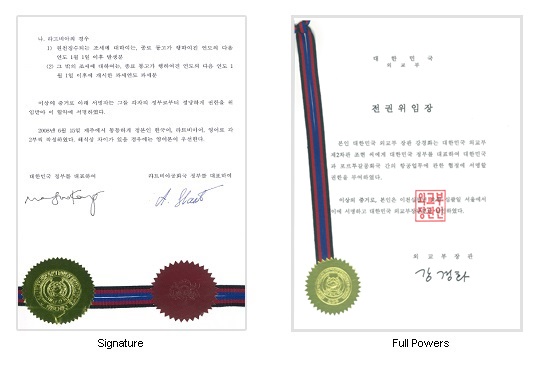
- Consent to the Ratification of the Text by the National Assembly
Article 60, paragraph 1 of the Constitution stipulates that the National Assembly shall have the right to consent to the conclusion and ratification of treaties pertaining to mutual assistance or mutual security; treaties concerning important international organizations; treaties of friendship, trade and navigation; treaties pertaining to any restriction in sovereignty; peace treaties; treaties which will burden the State or people with an important financial obligation; or treaties related to legislative matters. In such case, the International Legal Affairs Bureau drafts a ratification bill requesting the consent of the National Assembly to the conclusion and ratification of treaties, and the government then submits the bill to the National Assembly.
The requirement for obtaining the consent of the National Assembly means the legislative branch of the government exercises its democratic control over acts of the administrative branch, in accordance with the principle of checks and balances.
- Ratification
For those treaties which require ratification, instruments of ratification shall be exchanged between the parties. Nowadays, many states notify the other state of the completion of domestic procedures, instead of exchanging instruments of ratification when bringing a treaty into force.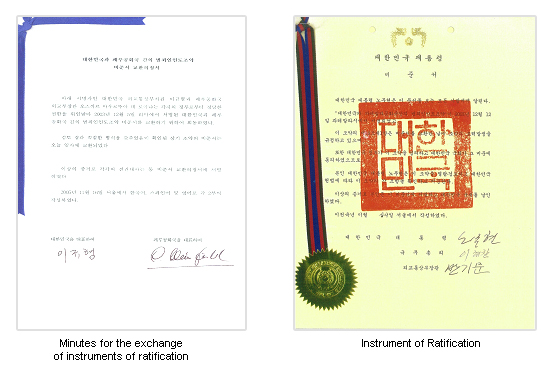
- Promulgation
In order to have domestic effect, treaties which were concluded through the above-mentioned process need to be promulgated in the official gazette. The Ministry of Foreign Affairs requests the Ministry of the Interior and Safety to promulgate such treaties. They are listed on the following website:
In addition to this promulgation, the bilateral treaties which enters into force are also listed on the MOFA website
Article 6, paragraph 1 of the Constitution states that treaties duly concluded and promulgated under the Constitution and the generally recognized rules of international law shall have the same effect as the domestic laws of the Republic of Korea.
- Decision on the Necessity of a Treaty
-
-
-
Multilateral Treaty-Making Process
-
How a multilateral treaty is concluded
- How is a multilateral treaty concluded?
The conclusion of a multilateral treaty is an arduous task that takes more than a few years. Numerous international conferences are held to coordinate conflicting interests of various countries and establish a new set of rules. Joining a multilateral treaty, whether it is a newly adopted treaty or an existing one, means the incorporation of the Contracting State into the legal system in that field. - Decision on the Necessity of Joining a Multilateral Treaty
First, a decision on the necessity of joining a multilateral treaty is made by the relevant ministries. In case of joining a newly adopted treaty, the Government may send government officials and experts to international conferences to take part in the work of drafting the text of the relevant treaty.
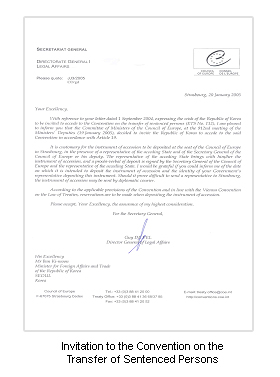
- Beginning of the Domestic Procedure
The International Legal Affairs Bureau initiates the domestic procedure for signing, ratifying, accepting, approving, or acceding to the multilateral treaty. The necessity for the reservation to that treaty will also be decided upon. The Director-General reviews the text of the treaty and prepares the corresponding Korean text in consultation with the relevant government ministries and also provides the necessity of specific legislations related to the treaty. - Review by the Ministry of Government Legislation
As is the case with bilateral treaties, all proposed multilateral treaties are reviewed by the Ministry of Government Legislation before being sent to the State Council for its deliberation. The International Legal Affairs Bureau requests the Ministry of Government Legislation to review proposed treaty texts. The Ministry of Government Legislation notifies the International Legal Affairs Bureau of the review results, including the decision as to whether or not the treaty requires the consent of the National Assembly. - Deliberation by the State Council
The International Legal Affairs Bureau refers treaties reviewed by the Ministry of Government Legislation to the State Council, in accordance with Article 89, paragraph 3 of the Constitution. Before deliberation by the State Council, proposed treaties are discussed by the Council of Vice Ministers. - Signature and Approval by the President
After the deliberation by the State Council, the International Legal Affairs Bureau submits the treaty text to the Foreign Minister and Prime Minister for their approval. After that, the text is given the President's constitutional approval for the signature by a representative of the Government or the consent by the National assembly to the ratification of the treaty. In accordance with the Act on the Appointment and Powers of Government Delegates and Special Envoys, the Minister of Foreign Affairs may sign a treaty without requiring full powers issued by the President.Any other person may be appointed as a representative and sign a treaty if he or she possesses a valid instrument of full powers, which is issued by the Minister of Foreign Affairs. However, in the case of signing certain types of treaties, the President, on the recommendation of the Minister of Foreign Affairs, will appoint the representative and issue full powers. The International Legal Affairs Bureau prepares the instruments of full powers.
- Consent to the Ratification of the Treaty by the National Assembly
In accordance with Article 60, paragraph 1 of the Constitution, the ratification of some treaties requires the consent of the National Assembly. The Ministry of Government Legislation, considering the opinion of the International Legal Affairs Bureau, decides whether or not the proposed treaty requires the consent of the National Assembly.To get the consent of the National Assembly, the International Legal Affairs Bureau drafts a ratification bill requesting the consent of the National Assembly to the treaty, and then the government submits the bill to the National Assembly.
- Ratification
After the signature of the treaty or consent to its ratification, the International Legal Affairs Bureau drafts the instruments for ratification, acceptance, approval, or accession and deposits them with the treaty depositary. - Promulgation
A multilateral treaty, for which the above-mentioned procedures have been completed, will be promulgated in the official gazette by the Ministry of the Interior and safety. The International Legal Affairs Bureau requests the Ministry of the Interior and Safety to promulgate the treaty. In addition to this promulgation, the version in the official language and the Korean translation of the multilateral treaties are also available on the MOFA website.A duly concluded and promulgated multilateral treaty will have the same legal effect as the domestic legislation.
- Amendments and Advice
Amendments of a treaty also follow the same procedures as outlined above.
Upon request by related ministries or other offices of MOFA, the International Legal Affairs Bureau offers information about the treaty, such as the status of the state parties and the interpretation or application of the treaty. - Can an international organization conclude a treaty with states?
The traditional view is that only states are able to conclude a treaty. There is no doubt that international law is still applied primarily to states, but in recent years, international law may apply to other international actors as well.
In particular, international organizations play a pivotal role in the international society. International organizations are often established by international treaties, which determine their status and functions including their legal capacity. Most international organizations have international legal personalities and thus have the legal capacity to conclude treaties with states or other international organizations. (The Vienna Convention on the Law of Treaties between States and International Organizations or between International Organizations provides the set of rules for the conclusion of treaties between them.)
However, it should also be noted that an international organization is permitted to conclude a treaty only within the framework of the purposes and functions of that organization authorized by its constitutional convention or statute. For example, it is not possible for the World Health Organization to make a mutual defense treaty with states on the Pacific, as such a treaty would be beyond the authority of the WHO.
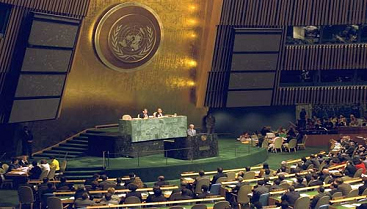 UN General Assembly
UN General Assembly
- How is a multilateral treaty concluded?
-
-




